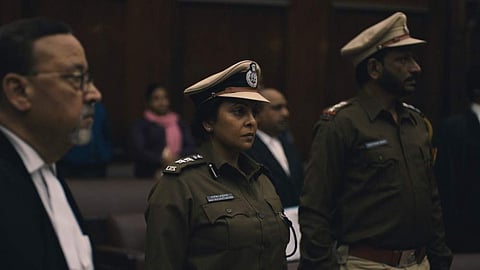Delhi Crime Review: A gritty retelling of the Nirbhaya incident that both humanises and glorifies the Delhi Police
Rating:(3.5 / 5)
An overworked cop gets an emergency call. He reaches the location to find a young naked couple lying on the side of the street. The girl is bleeding profusely and the guy is holding on to her for dear life. The police take them to the hospital. Higher authorities are informed, and DCP Vartika Chaturvedi (a splendid Shefali Shah) assigns herself to the case. She reaches the hospital and loses her cool with the doctor on duty, who looks her straight in the eye, and says, "I know my job, ma'am."
Cast: Shefali Shah, Rasika Dugal, Rajesh Tailang, Adil Hussain
Director: Richie Mehta
While Delhi Crime, the new Netflix show, might be thought of as primarily a gut-wrenching retelling of the 2012 Nirbhaya case, it is actually a gritty portrayal of the Delhi Police, who had to do their thankless jobs efficiently and apprehend these criminals. The show uses the case to break down the functioning of these workhorses -- their strengths, pressures, weaknesses, perceptions, and most importantly, emotions.
The show's creator, writer, and director, Richie Mehta isn't afraid to pull any punches and shows the failings of the police, and the system, as is. Take for instance, the overworked cop, with 34 years of experience in Delhi police, who decides to comfort the victim's parents by saying that it was very cold outside and their daughter was lucky because she was too numb to feel the pain. You have a police station that suddenly goes dark because there were no funds to pay the electricity board. You also have police discussing jurisdiction while deciding who should handle the investigation.
On one level, it seems appalling that they are arguing over jurisdiction when a heinous crime has been committed. But then again, isn't this just another crime for them? An investigating officer even asks Vartika, "What's so special about this case. We have seen so many gang rapes. How is this case any different from the one with the beer bottle?" Vartika replies, "This is demonic."
While Richie doesn't resort to showing the violence on screen, be warned that the incident is recounted thrice. Twice by the victim, and once by the perpetrator. Three bone-chilling narrations about how the heinous act was orchestrated.
In between all this, there are also brief looks into the lives of each of the investigative officers. If Vartika is trying to change the opinion of her daughter who wants to go to Canada because she feels Delhi is an unsafe city, IPS trainee Neeti Singh (a restrained but effective Rasika Dugal) is someone who has come to Delhi to feel "independent." There is Bhupendra Singh (an ever-reliant Rajesh Tailang) who has to solve the crime keeping his prejudices aside. Adil Hussain plays Commissioner Vijay Kumar, who not only has to defend his team, but also negotiate government interference during the investigation. One officer wanted to become a teacher, and the other's entry into the force was by sheer accident. These nifty touches humanise the police force, which allows you to overlook certain other flaws in their policing.
The strength of this procedural drama lies in the performances, the nuanced characters, and the dialogues, which evoke a sense of understanding of the evil that occurred. Be it a throwaway line where one of the accused says, "I didn't rape her, I just had sex," or an investigative officer bellowing to another accused, "Why didn't you simply kill her and not do these things?", you oscillate between trying to understand the minds of these accused and wanting to exact vigilante justice. And it's not just us, but the police too, who are torn between these two extremes.
Delhi Crime also looks at how the media portrayed the investigation, how the people were misinformed (deliberately, at times), and how detrimental the public protests against the perceived inefficiency of the Delhi police was for the investigation.
A lot of gender dynamics too are at play in Delhi Crime, which might remind you of the Netflix movie, Soni. The comfort of time allows Richie to sketch this out in detail over seven episodes.
Right from the time DCP Vartika takes charge of the case, which shakes the entire country, we know how it will end. We know exactly what happened to the girl, who is called Deepika in this show. We know what happened to the accused too, one of whom was a juvenile. It has been six years since the incident, but we know every detail. It was there in our papers, our news channels, our Facebook walls, our Twitter timelines. But what we didn't know is how the Delhi police managed to apprehend all six criminals within five days of the incident. What we didn't know is how the doctors in the hospital did their duty without receiving even a passing mention anywhere. What we didn't know is how burdened the police force are. However, how much of this was fictionalised for dramatic purposes, I wonder.
Delhi Crime might be a glorification of the police force, but it is also a mirror to our society. It might absolve the Delhi police of its alleged dereliction of duties, but it is also a reminder that we vouched, and hoped, for a similar incident to never happen again. How do we sleep at night knowing we are continuously failing as a society? As Vartika says in answer to Neeti, who has conflicted emotions about the police work in times of grave injustices such as the ghastly gangrape, "If you are trying to ascribe meaning to all this, forget it."

